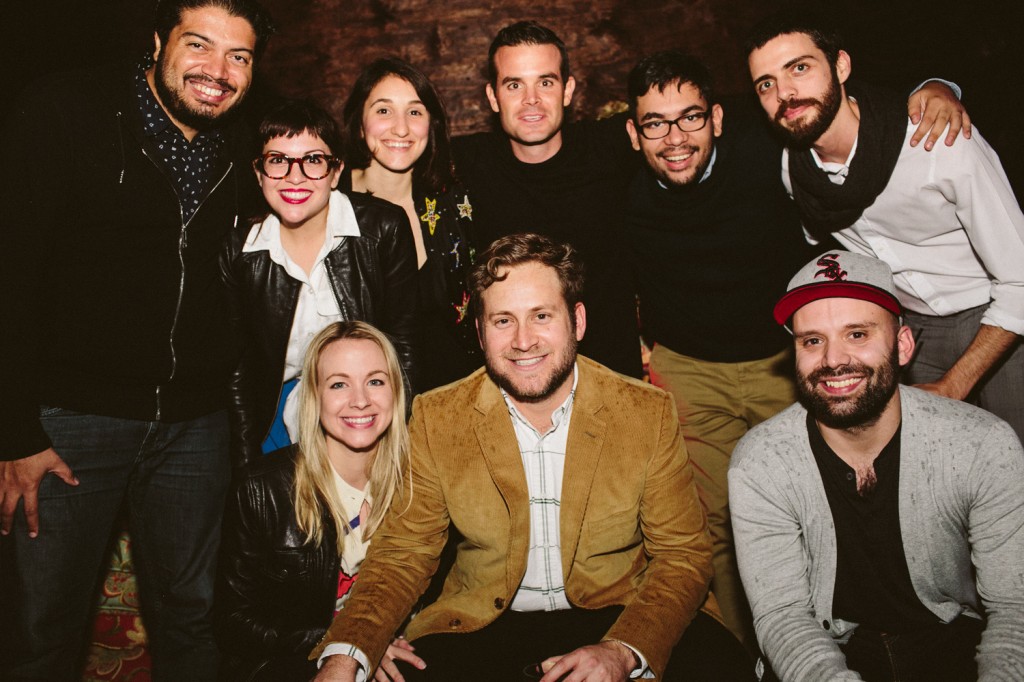
P. Scott Cunningham on Jai-Alai Books
As young boy, my grandmother took me to the smoke-filled betting floors of Dania Jai-Alai. That was more than 30 years ago, and I miss those hazy, teary-eyed hours spent following her around. I haven’t been back to Jai-Alai since, but Jai-Alai has, in many ways, come back to me. Jai-Alai Books, winner of a $40,000 2014 Knight Arts Challenge Award, aims to bridge, revitalize and reveal Miami’s literary community by publishing three to five books per year. I had the opportunity to interview Jai-Alai Books and O, Miami Poetry Festival Founder/Director P. Scott Cunningham about the future of Jai-Alai Books and literary publishing in Miami.
The Jai-Alai Books Team. Photo by Gesi Schilling
Neil de la Flor: Starting a publishing house in Miami–why in the world…? P. Scott Cunningham: Miami is the perfect place to publish books. There’s a wealth of material. There’s a strong sense of literary history, and there’s a population that’s really hungry for culture. We’re hoping that in a few years Jai-Alai is only small publisher of many.
ND: Miami has a dispersed and disparate literary community and O, Miami, Jai-Alai Book’s sister organization, has created bridges and tunnels and wormholes to connect us. How does Jai Alai further solidify this network? PSC: Hopefully the press will be another avenue where writers and readers can encounter one another. Jai-Alai is a regional press. We’re very proud of that. We’re not limiting who we’re publishing to Miami writers, but when we publish, our focus is Miami’s audience. We want to be a press that Miami readers recognize and can trust.
ND: Why Jai Alai? PSC: We wanted a name that said “Miami” without saying “Miami.” Jai-Alai is hard to pronounce. It’s weird. The game itself is full of tradition. Almost every aspect of the clothing and instruments is handmade. It’s a nice mix of classy and seedy. It should be dead, but it’s not.
ND: Give us the nuts and bolts. What will you publish, how often and how do we all get involved? PSC: For the first three years, we’re going to publish three to five books per year in a variety of genres. We’ve already published a guide to foraging and two bilingual poetry books. We definitely have a couple more non-fiction projects in the works, and we want to do a fiction project. We’re going to open up a submission system to the public in 2015. We’re not doing e-books for the time being. All the books will be well-made and designed, but we’ll have a variety of different processes for doing them. Some of those processes will be expensive. Some won’t. We’re really interested in treating each book as its own design challenge, and especially early on, experimenting with ways of presenting texts to readers that privilege the experience of holding a book, flipping through pages, etc. In other words, all the ways in which physical books are pleasurable.
ND: What’s your stand on e-books? Is there a future in it for Jai-Alai? PSC: We’re not going to do e-books out of the gate. That’s not so much a philosophical stance as it is a practical one. We have a lot of experience in making print objects. It’s a product we understand, and we feel confident working in that medium. None of us are programmers or e-book readers, so we honestly would not know what we were doing. More than anything, we believe in making things the right way, and there’s no way we could make a good e-book. We might as well try to make a spaceship. As the press develops, as we develop, and as the e-book form and market develops, it’s something we’ll re-explore.
ND: What’s the future of Miami’s literary culture? PS: Miami needs to be a crossroads for North and South American literature. That’s kind of a no-brainer. I’d also like Miami to become a place where literary culture is pervasive and – how do I say this? – non-specialized.
There’s always going to be a group of engaged practitioners of an art form who cater a scene around that art form. And that’s fine. But I’m more interested in Miami being a place where you can talk poetry with your dentist or your Publix cashier. And I think we’re much closer to that than people realize. I’ve met very few people in Miami who have no interest in literature. That might sound insane to some people, but I think my opinion is more informed because every day I’m forced to admit to people that my job is poetry. Rather than getting a laugh or an uncomfortable stare, I usually receive a meaningful and personal response.
Recent Content
-
Artsarticle ·
-
Artsarticle ·
-
Artsarticle ·

